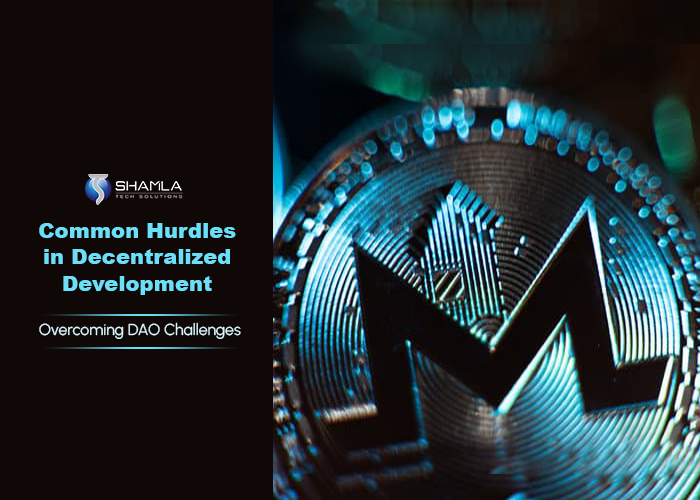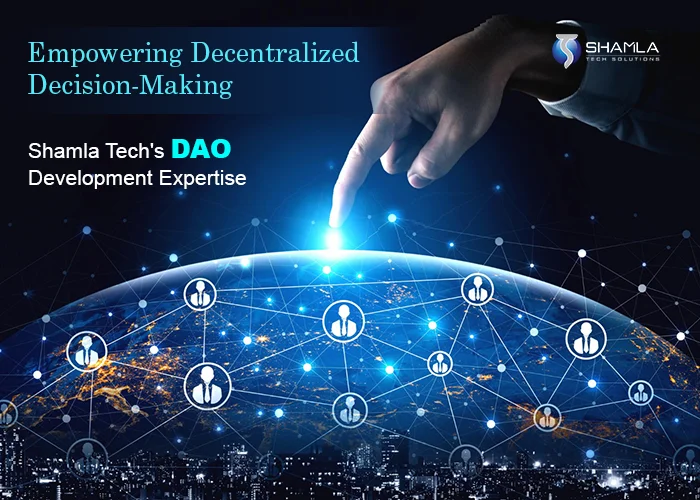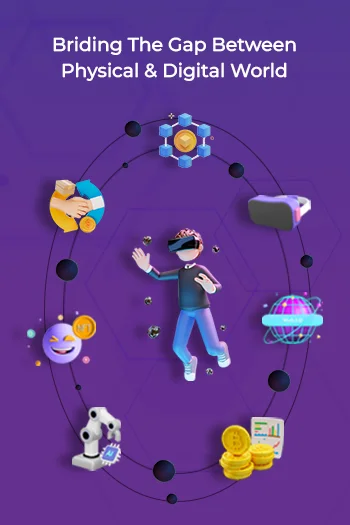What is a DAO Development?
DAO development involves creating Decentralized Autonomous Organizations (DAOs), which are entities governed by code on a blockchain network. It encompasses designing and deploying smart contracts to automate decision-making processes, establishing governance mechanisms for transparent participation, and ensuring robust security through audits and protocols. DAO development also focuses on crafting user-friendly interfaces for seamless interaction, integrating with the broader blockchain ecosystem for interoperability, and providing ongoing support and maintenance.
DAO development companies specialize in offering consultation, customization, technical expertise, and continuous assistance to clients seeking to harness the potential of decentralized governance models. Through their services, DAO development companies facilitate the creation of innovative organizational structures that empower communities, businesses, and individuals to collaborate and govern themselves autonomously.
How does a DAO work?
A DAO, or Decentralized Autonomous Organization, operates through smart contracts on a blockchain, enabling decentralized decision-making and management. Here’s how it typically works:
Smart Contracts: Smart contracts are self-executing agreements with the terms of the contract directly written into code. In the context of a DAO, smart contracts define the rules and operations of the organization. They govern key functions such as membership management, voting processes, fund management, and the execution of proposals. These contracts are deployed on a blockchain, ensuring transparency, security, and immutability of the DAO’s operations.
Membership: DAO membership is typically represented by tokens held by individuals. These tokens often confer voting rights and ownership stakes in the organization. Members acquire tokens through various means such as purchasing them in token sales, earning them through contributions to the DAO, or receiving them as rewards for participation in the organization’s activities.
Voting and Governance: Voting is a fundamental aspect of DAO governance. Members use their tokens to cast votes on proposals submitted to the DAO. Proposals can cover a wide range of topics, including allocating funds, changing organizational parameters, or making strategic decisions. The DAO’s smart contracts dictate the rules for voting, including the duration of voting periods, the quorum required for a vote to be valid, and the threshold for passing a proposal.
Proposal Submission: Any member of the DAO can submit a proposal for consideration by the community. Proposals typically include detailed information about the proposed action, its rationale, and any associated resource requirements. Proposals are often submitted through a designated platform or interface linked to the DAO’s smart contracts.
Voting Process: Once a proposal is submitted, DAO members have a specified period to review and cast their votes. During this voting period, members can examine the proposal, discuss it with other members, and decide whether to support or oppose it. The DAO’s smart contracts track the voting process, ensuring transparency and fairness.
Execution of Decisions: After the voting period concludes, the DAO’s smart contracts automatically execute the decision based on the outcome of the vote. For example, if a proposal to allocate funds receives sufficient support, the smart contract will transfer the specified amount of funds to the designated recipient address. This automated execution ensures that decisions are implemented efficiently and without the need for centralized authority.
Transparency and Immutability: All actions and decisions within a DAO are recorded on the blockchain, providing a transparent and immutable record of the organization’s activities. This transparency fosters trust among members and ensures accountability. Once recorded on the blockchain, transactions and decisions cannot be altered or tampered with, enhancing the integrity of the DAO’s operations.
Adaptability: DAOs are designed to be adaptable and responsive to changing circumstances and community preferences. The organization’s smart contracts and governance protocols can be updated and amended through a governance process that involves proposing and voting on changes. This flexibility allows DAOs to evolve over time, iterate on their governance mechanisms, and better serve the needs of their members and stakeholders.
By operating on blockchain technology and utilizing smart contracts, DAOs enable decentralized, transparent, and efficient decision-making and management processes, without the need for centralized intermediaries.
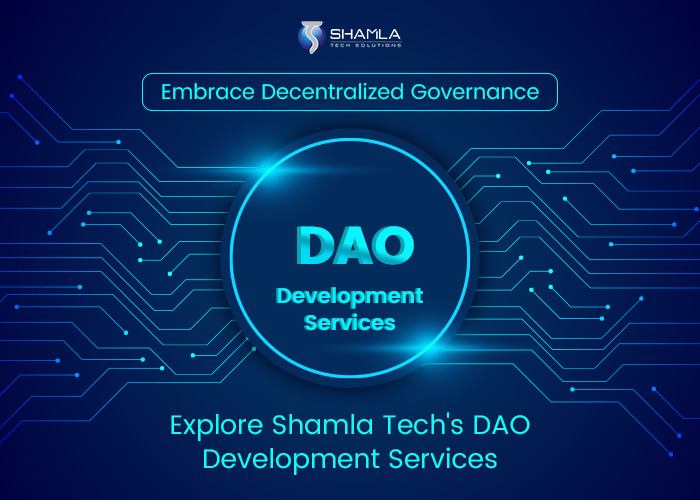
How to develop a DAO?
Developing a DAO involves several steps, including conceptualization, smart contract development, testing, deployment, and ongoing maintenance. Here’s a general guide on how to create a DAO:
Define the Purpose and Structure: Start by clearly articulating the purpose and objectives of your DAO. Consider what you aim to achieve through decentralized governance, funding, or other activities. Define the governance structure, including membership criteria, voting mechanisms, and decision-making processes. Determine the scope of activities the DAO will undertake, such as funding projects, managing assets, or governing a protocol. Also, consider tokenomics, including token distribution, utility, and mechanisms for incentivizing participation.
Choose the Blockchain Platform: Research and evaluate different blockchain platforms based on factors such as scalability, security, developer support, and ecosystem maturity. Evaluate the features and capabilities of each platform, including smart contract functionality, transaction throughput, and interoperability. Choose a platform that aligns with the requirements and objectives of your DAO, considering factors like community adoption and network effects.
Design Smart Contracts: Identify the core functionalities and processes that need to be implemented as smart contracts. Break down the DAO’s operations into individual smart contracts, such as membership management, voting, proposal submission, fund management, and token governance. Define the data structures, functions, and interactions for each smart contract, ensuring alignment with the DAO’s governance model and objectives. Follow best practices for smart contract development, including security considerations and gas optimization.
Implement Governance Mechanisms: Determine the governance mechanisms that will govern decision-making within the DAO. Choose appropriate voting mechanisms, such as token-weighted voting or delegation, based on the DAO’s objectives and community preferences. Define parameters for voting, such as voting periods, quorum requirements, and the threshold for passing proposals. Consider implementing mechanisms for governance participation incentives, such as token rewards or reputation systems.
Develop User Interfaces: Design intuitive and user-friendly interfaces for interacting with the DAO’s functionalities. Develop web-based applications, mobile apps, or decentralized applications (DApps) that provide access to features such as submitting proposals, casting votes, monitoring governance activities, and managing membership. Ensure that the interfaces are accessible, responsive, and compatible with a wide range of devices and browsers to maximize user engagement.
Test the DAO: Conduct comprehensive testing of the smart contracts and user interfaces to identify and fix any bugs, vulnerabilities, or usability issues. Perform unit tests to verify the functionality of individual smart contract components. Conduct integration tests to ensure that different parts of the DAO’s system interact correctly with each other. Engage third-party security auditors to perform code reviews and penetration testing to identify and mitigate security risks.
Deploy the DAO: Choose an appropriate deployment strategy and network for deploying the DAO’s smart contracts, such as a testnet for initial testing and a mainnet for production deployment. Deploy the smart contracts to the chosen blockchain platform using tools like Truffle, Hardhat, or Remix. Verify the deployment and functionality of the smart contracts on the blockchain, ensuring that they operate as intended and are accessible to users.
Launch and Iterate: Launch the DAO and invite members to join and participate in governance activities. Monitor the DAO’s performance and gather feedback from members to identify areas for improvement. Iterate on the DAO’s design and governance mechanisms based on real-world usage and community input, implementing upgrades and enhancements as needed. Continuously engage with the DAO’s community to foster participation, resolve issues, and drive adoption and growth.
Community Engagement and Maintenance: Foster an active and engaged community around the DAO by organizing events, hosting discussions, and providing support to members. Establish communication channels such as forums, chat groups, or social media channels to facilitate interaction and collaboration among DAO members. Regularly update the DAO’s smart contracts and interfaces to address bugs, implement new features, and adapt to changing requirements or market conditions. Maintain transparency and accountability by providing regular updates on the DAO’s activities, finances, and governance decisions to its members and stakeholders.
By following these steps and staying engaged with your community, you can develop a successful and resilient DAO that empowers its members and achieves its objectives in a decentralized and transparent manner.
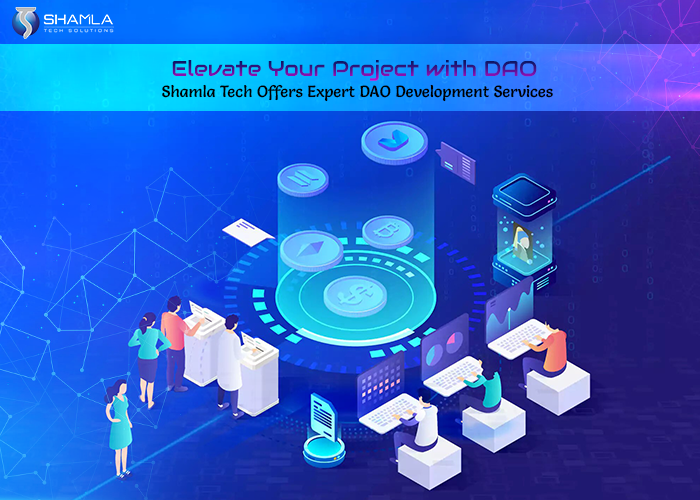
What are the benefits of a DAO?
Decentralized Autonomous Organizations (DAOs) offer numerous benefits, leveraging blockchain technology to revolutionize traditional organizational structures. Some key advantages of DAOs include:
Transparency: DAOs leverage the transparency of blockchain technology, which records all transactions and activities on a public ledger. This transparency fosters trust among members, investors, and stakeholders, as they can verify the integrity of the DAO’s operations in real-time. By providing visibility into the decision-making processes and financial transactions, DAOs promote accountability and reduce the risk of fraud or mismanagement.
Decentralization: Unlike traditional organizations that rely on centralized authorities for decision-making, DAOs distribute power and governance among their members. This decentralization minimizes the influence of any single entity or group and prevents monopolistic control. By empowering individual members to participate in governance decisions, DAOs foster a more democratic and equitable organizational structure.
Censorship Resistance: DAOs are resistant to censorship and external interference due to their decentralized nature. Since they operate on blockchain networks that are distributed across multiple nodes worldwide, it’s nearly impossible for any individual or organization to censor transactions or block participation in the DAO. This censorship resistance ensures that DAOs can operate autonomously and without fear of external manipulation or coercion.
Efficiency: By automating governance processes through smart contracts, DAOs improve operational efficiency and reduce administrative overhead. Smart contracts execute predefined rules and conditions automatically, eliminating the need for manual intervention or intermediaries. This automation streamlines decision-making, accelerates proposal execution, and minimizes the risk of human error, leading to greater efficiency and cost savings for the DAO.
Inclusivity: DAOs offer an inclusive and accessible platform for participation, allowing individuals from diverse backgrounds and geographic locations to join and contribute. Anyone with internet access and the necessary tokens can become a member of a DAO, regardless of their nationality, financial status, or institutional affiliation. This inclusivity promotes diversity, fosters innovation, and expands opportunities for collaboration and community engagement within the DAO ecosystem.
Innovation: DAOs serve as incubators for innovation, enabling experimentation with new governance models, economic incentives, and organizational structures. They provide a flexible framework for funding and governing innovative projects, protocols, and initiatives in emerging fields such as decentralized finance (DeFi), non-fungible tokens (NFTs), and decentralized autonomous organizations (DAOs). By facilitating collaboration and resource pooling among stakeholders, DAOs accelerate the pace of innovation and drive the development of novel solutions to complex challenges.
Community Ownership: DAOs promote community ownership and engagement by aligning incentives with the interests of their members. Token holders have a direct stake in the success of the DAO, as ownership and decision-making power are tied to their token holdings. This alignment of incentives encourages active participation, collaboration, and contribution to the DAO’s objectives, fostering a strong sense of community ownership and solidarity.
Scalability: DAOs are designed to scale seamlessly to accommodate a growing number of members and stakeholders. As the size and complexity of the DAO increase, governance processes can be adapted and optimized to ensure continued effectiveness and scalability. By leveraging blockchain technology and decentralized protocols, DAOs can scale without relying on centralized infrastructure or governance bodies, enabling them to grow and evolve organically over time.
Resilience: DAOs are inherently resilient to single points of failure and external attacks, thanks to their decentralized architecture and cryptographic security features. Even in the face of node failures, network partitions, or cyber attacks, DAOs can continue to operate and execute their functions autonomously. This resilience ensures continuity and reliability, making DAOs a robust and dependable framework for decentralized governance and collaboration.
Overall, the benefits of DAOs stem from their decentralized, transparent, and inclusive nature, which empowers individuals to participate in governance, drive innovation, and collectively create value in a distributed and equitable manner.
What are the key factors to consider when choosing the best DAO development company?
Choosing the best DAO development company is crucial for the success of your decentralized project. Here are key factors to consider when making your decision:
Expertise and Experience: Look for a DAO development company with a proven track record of successfully delivering DAO projects. Check their portfolio, client testimonials, and case studies to assess their experience and expertise in blockchain development, smart contract programming, and decentralized governance.
Technical Proficiency: Ensure that the DAO development company has a deep understanding of blockchain technology, smart contract development, cryptography, and decentralized systems. Verify that the company has a skilled team of blockchain developers with expertise in relevant programming languages (such as Solidity, Vyper, or Rust) and experience in building complex smart contracts and decentralized applications (DApps). Assess their technical proficiency, coding standards, and ability to implement secure and efficient solutions.
Security and Auditing: Security is paramount in the world of decentralized finance (DeFi) and DAOs. Choose a DAO development company that prioritizes security by conducting rigorous audits of smart contracts to identify and mitigate potential vulnerabilities. Look for certifications or affiliations with reputable security firms to ensure the robustness and integrity of your DAO’s code.
Governance Expertise: Governance is a critical aspect of DAOs, influencing decision-making processes, voting mechanisms, and community participation. Seek a DAO development company that specializes in designing and implementing effective governance mechanisms tailored to your project’s needs. Evaluate their understanding of governance models, voting systems, and dispute resolution mechanisms to ensure alignment with your objectives.
User Experience (UX) Design: A user-friendly interface is essential for maximizing participation and engagement within your DAO. Choose a DAO development company that prioritizes UX design, creating intuitive and seamless user experiences for interacting with the DAO’s platform. Assess their previous UI/UX work and usability testing methodologies to ensure a positive user experience for your community members.
Security and Auditing: Ensure that the company prioritizes security in their development process and follows best practices for smart contract security and auditing. Look for companies that conduct rigorous code reviews, security audits, and penetration testing to identify and mitigate potential vulnerabilities and ensure the robustness and reliability of your DAO.
Customization and Flexibility: Select a DAO development company that offers customizable solutions tailored to your specific requirements and objectives. They should be able to adapt their development approach and methodologies to accommodate your unique needs, preferences, and constraints, whether you’re building a DAO for decentralized finance (DeFi), governance, tokenization, or other purposes.
Community Engagement: Building and nurturing a vibrant community is key to the success of your DAO. Select a DAO development company that values community engagement and participation, actively involving stakeholders in the development process and fostering open communication channels. Look for evidence of community building initiatives, educational resources, and support services to empower your community members and promote long-term growth.
Scalability and Future-Proofing: Choose a DAO development company that designs scalable and future-proof solutions capable of accommodating growth and evolving requirements over time. They should be able to anticipate potential challenges and design resilient architectures and governance frameworks that can adapt to changing circumstances and emerging trends in the blockchain ecosystem.
Cost and Value Proposition: Evaluate the company’s pricing structure, value proposition, and cost-effectiveness in relation to the quality of their services and the expected return on investment (ROI) for your project. While cost is important, prioritize value and quality over price alone, as investing in a reputable and competent development partner can yield greater long-term benefits for your DAO project.
Reputation and Reliability: Research the reputation and reliability of the DAO development company within the blockchain community. Seek recommendations from trusted sources, review online forums and social media channels for feedback, and assess their standing in industry rankings and directories. Choose a company with a solid reputation for professionalism, integrity, and customer satisfaction.
By considering these key factors and conducting thorough due diligence, you can select a DAO development company that aligns with your goals, requirements, and expectations, and helps you build a successful and sustainable decentralized autonomous organization.
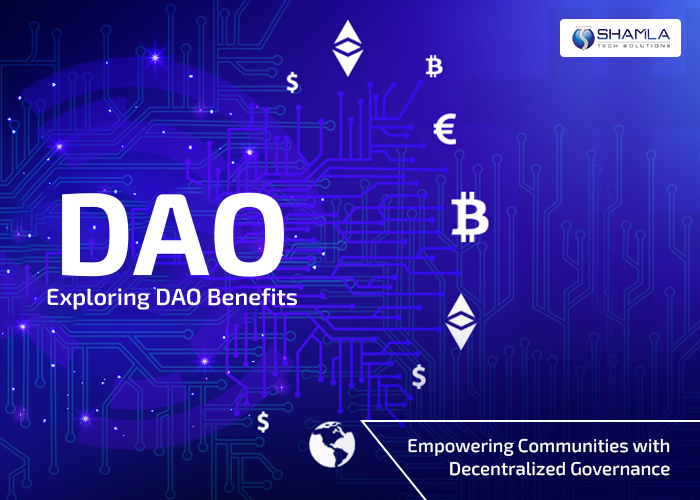
What is the typical process of working with a DAO development company?
Working with a DAO development company involves a structured process to bring your decentralized project from conception to deployment. Here’s a typical outline of the steps involved to make a DAO:
Initial Consultation and Discovery:
- You begin by reaching out to the DAO development company to discuss your project idea, goals, and requirements.
- The company conducts an initial consultation to understand your needs, assess the feasibility of the project, and determine the scope of work.
- During this phase, you may also discuss timelines, budget, and any specific technical or design preferences.
Project Planning and Proposal:
- Based on the information gathered during the initial consultation, the DAO development company prepares a project proposal outlining the scope of work, deliverables, timeline, and cost estimates.
- You review the proposal and provide feedback or request revisions as needed to ensure alignment with your objectives and expectations.
- Once both parties agree on the terms, a formal agreement or contract is drafted and signed to initiate the project.
Design and Architecture:
- The DAO development company begins the design and architecture phase, where they collaborate with you to conceptualize the structure, functionality, and user experience of the DAO.
- This phase may involve wireframing, prototyping, and designing the user interface (UI) and user experience (UX) elements of the DAO’s platform.
- You provide feedback and iterate on the design until a final concept is approved.
Development and Implementation:
- With the design finalized, the development team starts coding the smart contracts, backend infrastructure, and frontend components of the DAO’s platform.
- They follow best practices in blockchain development, security protocols, and coding standards to ensure the robustness and integrity of the codebase.
- Throughout the development process, you have regular communication with the team to track progress, address any issues or concerns, and provide feedback on the evolving product.
Testing and Quality Assurance:
- Once the initial development is complete, the DAO development company conducts comprehensive testing and quality assurance (QA) to identify and address any bugs, vulnerabilities, or performance issues.
- This phase may include unit testing, integration testing, security auditing, and user acceptance testing to validate the functionality and stability of the DAO’s platform.
- You participate in the testing process, providing feedback and sign-off on the final product before deployment.
Deployment and Launch:
- After successful testing and QA, the DAO development company prepares for deployment by configuring the smart contracts and deploying them to the chosen blockchain network.
- They assist with the setup of infrastructure, hosting, and any necessary integrations to ensure a smooth launch of the DAO’s platform.
- You coordinate the launch activities, including community outreach, marketing, and onboarding of initial users and stakeholders.
Post-Launch Support and Maintenance:
- Following the launch, the DAO development company provides ongoing support and maintenance to address any issues, implement updates, and optimize the performance of the platform.
- They monitor the DAO’s operations, respond to user feedback, and proactively identify opportunities for improvement or expansion.
- You continue to collaborate with the development team to evolve the DAO over time, adding new features, expanding functionality, and scaling the platform to meet growing demand.
By following this typical process, you can effectively collaborate with a DAO development company to bring your decentralized project to life and achieve your goals in the world of blockchain and decentralized finance (DeFi).
What are some common challenges faced in DAO Development?
Developing a DAO can be a complex endeavor, and several challenges may arise throughout the process. Some common challenges faced in DAO development include:
Security Vulnerabilities: Smart contracts powering DAOs are susceptible to security vulnerabilities, such as code bugs, logic flaws, or vulnerabilities in external dependencies. These vulnerabilities can be exploited by attackers to steal funds, manipulate governance processes, or disrupt the functioning of the DAO. Thorough code review, auditing, and testing are essential to identify and mitigate security risks.
Governance Scalability: As the number of members and stakeholders in a DAO grows, governance processes may become increasingly complex and challenging to manage. Scaling governance mechanisms to accommodate a large and diverse community while maintaining efficiency, fairness, and inclusivity can be a significant challenge. Implementing scalable voting mechanisms, delegation systems, and governance protocols is critical to address this challenge.
Voter Apathy and Participation: Ensuring active participation and engagement from DAO members in governance activities can be challenging, as voter apathy and low turnout rates are common issues. Ineffective communication, lack of incentives, or unclear decision-making processes may contribute to reduced participation. DAOs need to implement strategies to incentivize and encourage members to participate in governance decisions, such as rewarding active contributors or implementing reputation-based voting systems.
Legal and Regulatory Compliance: Navigating the legal and regulatory landscape can pose challenges for DAO development, especially concerning issues such as securities regulations, tax compliance, and jurisdictional constraints. DAOs may face regulatory uncertainty or legal scrutiny, particularly in jurisdictions with strict regulations governing blockchain-based organizations. Ensuring compliance with relevant laws and regulations while maintaining decentralization and autonomy is a complex balancing act for DAO developers.
Coordination and Consensus: Achieving consensus among DAO members on governance decisions can be challenging, particularly in decentralized and geographically dispersed communities. Disagreements, conflicting interests, or lack of alignment may hinder consensus-building efforts and impede decision-making processes. Effective communication, transparent governance mechanisms, and dispute resolution mechanisms are essential for resolving conflicts and fostering consensus within the DAO.
Technological Complexity: Developing and deploying a DAO involves navigating a complex technological landscape, including blockchain technology, smart contracts, decentralized storage, and distributed consensus algorithms. Understanding and integrating these technologies effectively require specialized knowledge and expertise, which may be challenging to acquire. Additionally, rapid advancements in blockchain technology and evolving best practices add to the complexity of DAO development.
User Experience and Adoption: Ensuring a seamless and intuitive user experience is crucial for driving adoption and engagement in DAOs. However, designing user-friendly interfaces and onboarding processes for decentralized applications (DApps) can be challenging, particularly for users unfamiliar with blockchain technology. Improving usability, providing clear documentation, and offering user support are essential for overcoming adoption barriers and attracting users to the DAO platform.
Addressing these challenges requires careful planning, collaboration, and ongoing iteration to build robust and successful DAOs that fulfill their objectives and empower their communities effectively. It also requires a multidisciplinary approach, combining expertise in blockchain technology, smart contract development, governance mechanisms, security protocols, and community management. By overcoming these challenges, DAO developers can unlock the full potential of decentralized governance and empower communities to collaborate and govern themselves autonomously.
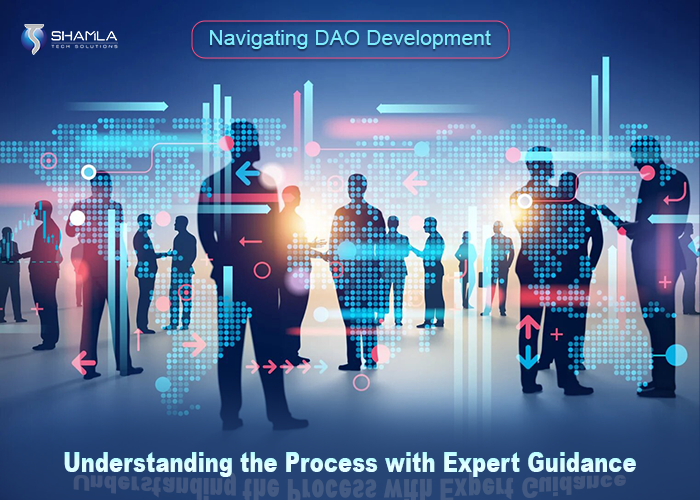
How can I participate in a DAO?
Participating in a DAO involves several steps, which may vary depending on the specific DAO and its governance mechanisms. Here’s a general guide on how to participate in a DAO:
Acquiring Tokens: Most DAOs require participants to hold tokens that represent membership or voting rights within the organization. To participate, you need to acquire these tokens through various means:
- Purchase tokens on cryptocurrency exchanges where they are listed for trading.
- Earn tokens by contributing to the DAO’s ecosystem, such as providing liquidity, staking tokens, or participating in community activities.
- Receive tokens as rewards for specific actions or contributions within the DAO, such as proposing and executing successful initiatives.
Understanding Governance Processes: Familiarize yourself with the governance processes and decision-making mechanisms of the DAO. This includes understanding how proposals are submitted, how voting is conducted, and how governance parameters are defined. Each DAO may have its own governance model, rules, and procedures, so it’s essential to review the DAO’s documentation and governance framework.
Engaging with the Community: Active participation and engagement with the DAO’s community are crucial for effective participation. Get involved in discussions, forums, and community channels where members share ideas, proposals, and feedback. Contributing constructively to the community dialogue can help you understand the DAO’s priorities, build relationships with other members, and influence governance decisions.
Submitting Proposals: If you have ideas or initiatives you’d like to propose to the DAO, you can submit proposals for consideration by the community. Proposals may include requests for funding, changes to governance parameters, or strategic decisions relevant to the DAO’s objectives. Follow the guidelines and submission process outlined by the DAO for proposing initiatives, and provide detailed information about your proposal’s rationale, objectives, and resource requirements.
Participating in Voting: DAO members typically have the opportunity to vote on proposals submitted to the DAO. When a proposal is open for voting, you can cast your vote to support or oppose it based on your assessment of its merit and alignment with the DAO’s goals. Pay attention to the voting period, voting requirements, and threshold for passing proposals, as specified by the DAO’s governance framework.
Monitoring Governance Activities: Stay informed about governance activities and decisions within the DAO by monitoring voting outcomes, proposal results, and updates from the DAO’s leadership or governance body. Participate in governance discussions, review voting results, and provide feedback on governance processes to help shape the direction of the DAO and contribute to its success.
Continuously Contributing and Participating: Participation in a DAO is an ongoing commitment, and it’s essential to continue contributing, engaging, and participating in governance activities over time. Stay active in the community, propose initiatives, vote on proposals, and collaborate with other members to drive positive outcomes and achieve the DAO’s objectives. By continuously contributing to the DAO’s ecosystem and governance processes, you can play an active role in shaping its evolution and success.
By following these steps and actively engaging with the DAO’s community and governance processes, you can participate meaningfully in the decision-making and governance activities of the DAO, contributing to its growth, success, and impact. Participating in a DAO requires active engagement, understanding of governance processes, and a commitment to contributing positively to the community.
